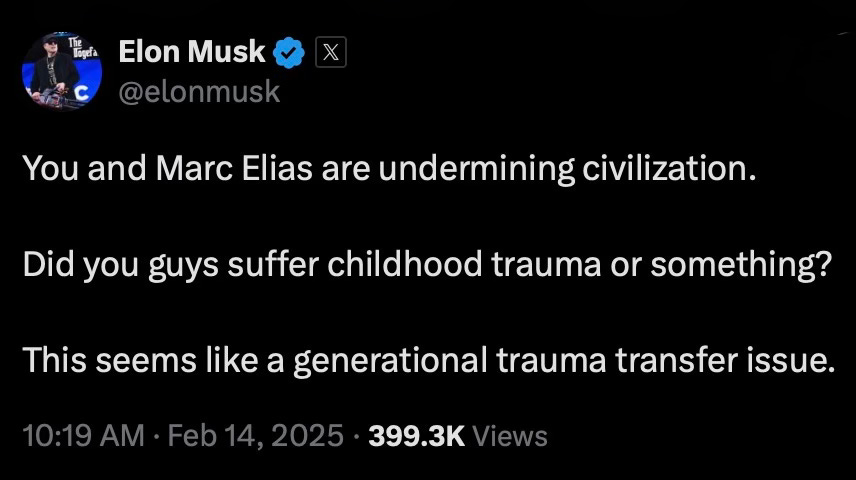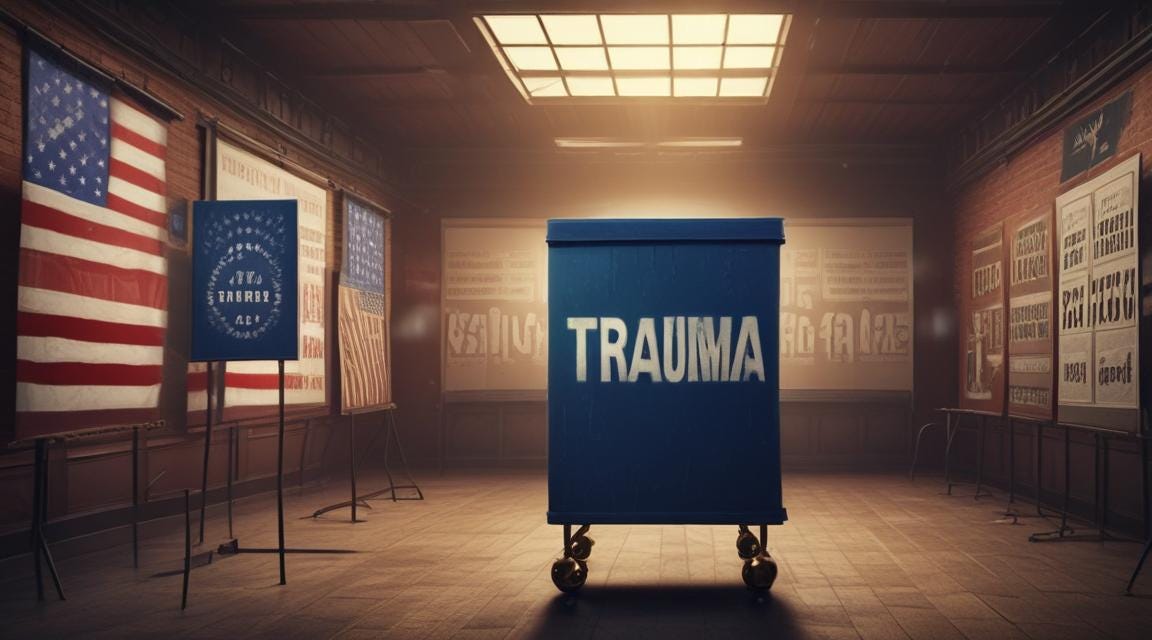Thanks, Elon Musk, for the teachable moment on trauma
The billionaire's mockery of Jewish lawyers sparked something meaningful.
When billionaire Elon Musk, a Trump-appointed bureaucrat who promotes far-right ideologies, recently lashed out at two Jewish lawyers by suggesting they’d suffered trauma, he meant it as an insult. Instead, it has turned into something else entirely — a teachable moment on the lasting biological, psychological and social impacts of adversity.
On Feb. 13, liberal lawyer Norm Eisen announced he was suing Musk for allegedly violating the Constitution by accessing Americans’ personal information from federal databases and by dismantling government agencies without Congressional approval. Musk denies wrongdoing and, in the data case, U.S. District Judge Tanya Chutkan acknowledged there’s legitimate reasons for concern but no specific evidence of improper actions to stop them.
On Feb. 14, Musk tried to dismiss Eisen and Marc Elias, another elections attorney for the Democratic Party:
“Did you guys suffer childhood trauma or something? This seems like a generational trauma transfer issue,” Musk wrote on X, the social media platform he owns, where he posted Nazi-themed puns last month after giving what appeared to be two Nazi salutes at an Inauguration Day rally for President Trump.
In an open letter published on Feb. 20, Elias shared his family’s history — Jewish immigrants fleeing persecution, the trauma of displacement and the resilience passed down through generations. His response reframed trauma not as weakness, but as something that shapes identity, purpose and the drive to protect democracy. In it, Elias writes:
“You don’t know me. You have no idea whether I have suffered trauma and if I have, how it has manifested. And it’s none of your business.
However, I will address your last point about generational trauma. I am Jewish, though many on your site simply call me “a jew.” Honestly, it’s often worse than that, but I’m sure you get the point. There was a time when Twitter would remove antisemitic posts, but under your leadership, tolerating the world’s oldest hatred now seems to be a permissible part of your “free speech” agenda.
Like many Jewish families, mine came to America because of trauma. They were fleeing persecution in the Pale of Settlement — the only area in the Russian Empire where Jews were legally allowed to reside. Even there, life was difficult — often traumatic. My family, like others, lived in a shtetl and was poor. Worse, pogroms were common — violent riots in which Jews were beaten, killed and expelled from their villages.
By the time my family fled, life in the Pale had become all but impossible for Jews. Tsar Nicholas II’s government spread anti-Jewish propaganda that encouraged Russians to attack and steal from Jews in their communities. My great-grandfather was fortunate to leave when he did. Those who stayed faced even worse circumstances when Hitler’s army later invaded.
That is the generational trauma I carry. The trauma of being treated as “other” by countrymen you once thought were your friends. The trauma of being scapegoated by authoritarian leaders. The trauma of fleeing while millions of others were systematically murdered. The trauma of watching powerful men treat it all as a joke — or worse.”
Elias continues his letter to Musk:
“You are very rich and very powerful. You have thrown in with Donald Trump. Whether it is because you think you can control him or because you share his authoritarian vision, I do not know. I do not care.
Together, you and he are dismantling our government, undermining the rule of law and harming the most vulnerable in our society. I am just a lawyer. I do not have your wealth or your platform. I do not control the vast power of the federal government, nor do I have millions of adherents at my disposal to harass and intimidate my opponents. I may even carry generational trauma.
But you need to know this about me. I am the great-grandson of a man who led his family out of the shtetl to a strange land in search of a better life. I am the grandson of the three-year-old boy on that journey. As you know, my English name is Marc, but my Hebrew name is Elhanan (אֶלְחָנָן) — after the great warrior in David’s army who slew a powerful giant.
I will use every tool at my disposal to protect this country from Trump. I will litigate to defend voting rights until there are no cases left to bring. I will speak out against authoritarianism until my last breath.
I will not back down. I will not bow or scrape. I will never obey.
Defiantly,
Marc Elias”
Intergenerational trauma is often dismissed or misunderstood, yet science and history tell us it is real. When people endure extreme adversity or hardship that overwhelms their ability to cope with the stress, the impact doesn’t just disappear. The wounds can be carried in the minds and bodies of the people who suffered and then passed on in the nervous systems, behaviors and even genes of those who followed in their footsteps. Trauma lingers in families and communities, shaping how people think, feel and react to the world — even generations later.
But just as harm can be passed down, so can strength. The ability to recognize and transform inherited wounds is itself a source of power. This moment is an opportunity — not just to respond to an insult, but to deepen our understanding of how trauma reverberates across time, shaping resilience, conviction and change as much as it shapes pain.
With rising authoritarianism, political polarization and social unrest, past and ongoing trauma is renewed every day. What if we could transform these echoes into something powerful? Something peaceful?
This is a time to reclaim the narrative. To turn a slur into knowledge, a dismissal into a dialogue. The more we understand how wounds live within us, the better equipped we are to turn them into wisdom and shape a different future. The threads of history do not have to bind us. They can guide us toward liberation.
New to Invisible Threads? I’m glad you’re here.
I’m Kate Woodsome, a writer, filmmaker and systems reformer, who’s spent 20 years navigating complex information environments in post-war, authoritarian and declining democracies. I began my career as a journalist reporting in Cuba, post-genocide Cambodia and Hong Kong before managing radio and television programs for Voice of America and Al Jazeera English, amplifying under-reported stories.
At The Washington Post, I founded a film production unit, pioneered a mental health column and reported on the Jan. 6 Capitol attack as part of the team that won the Pulitzer Prize for Public Service. I’ve also been recognized with the Ben Bradlee Award for Courage in Journalism, an Edward R. Murrow Award and honors from the White House News Press Photographers Association. I left The Post in 2023, no longer willing to normalize the trauma, burnout and moral injury pervasive in the industry.
Now a fellow at Georgetown University, I’m collaborating with trauma experts to empower people to move from struggle to strength. And with The Invisible Threads Project, I’m building an independent space to share stories, teach and bring people together — free from media industry pressures.
If you want to know more about how trauma shapes America, try this:
The biggest election issue no one's naming
“Probably the most important question in society is how to heal trauma and how not to pass on trauma to the next generation, and the next and next and next,” Dr. Peter Levine, a leading expert in the field of trauma healing, told me when I asked him what journalists and voters should be pressing politicians on this election season.






Both disgraceful and poignant message here. The degeneracy of an entitled mockery of a human being, and the moral authority of decency expressed through action.
Marc Elias is "spot on" with all that he said in response to the "King Maker". Thank you, Kate for bringing it to us. There are a lot more Marcs than there are Musks. The noise they make will be long and loud.